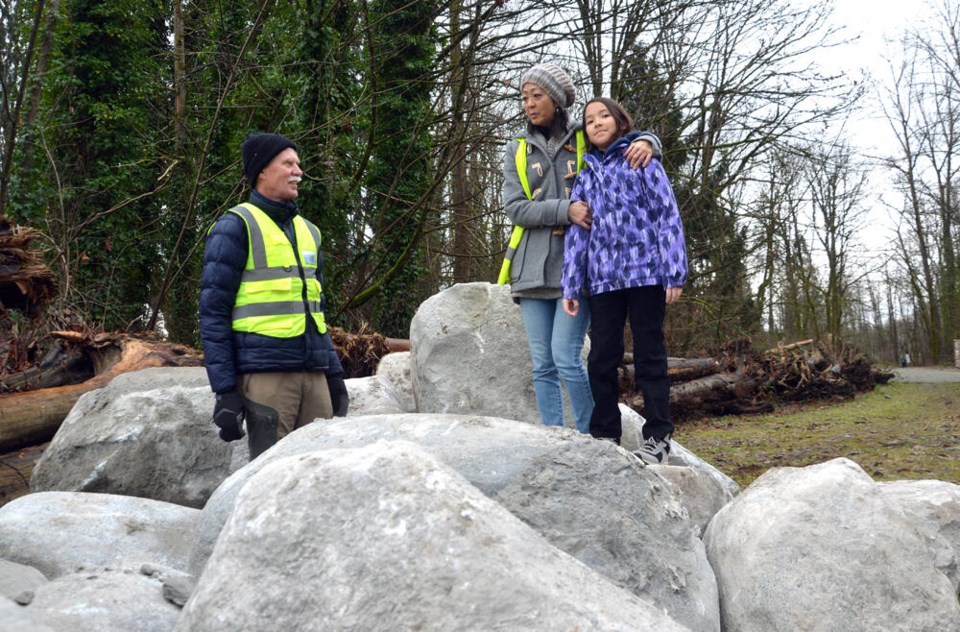Harry Jerome’s loss is about to become Lynn Creek’s gain.
The North Shore Streamkeepers are overseeing a project to restore a piece of fish habitat on the creek, using boulders excavated from the Harry Jerome Community Recreation Centre site.
Every salmonid type except for sockeye salmon live and spawn in Lynn Creek and its tributaries, but years of development and armoring along its banks have changed the way it flows, making the creek less hospitable for salmon and the aquatic life they feed on.
A smaller channel that would otherwise be good habitat, just north of St. Denis Avenue, routinely becomes blocked with gravel in the winter because of the creek’s unnaturally fast flow, causing it to dry up in the summer.
The Streamkeepers project will create an artificial “log jam” that redirects the creek, allowing water and gravel conditions to become more like they would be in a virgin river, giving salmon and steelhead trout a place to hide from predators, and to rest and find food.
“You’re protecting an ecosystem and everything that’s tied to it. It’s cleaner air, better management of stormwater surges from climate change. It helps us, the birds, the bees and everything,” said Glen Parker, North Shore Streamkeepers treasurer.
Throughout the morning on Wednesday, truckloads of boulders that been buried since the last ice age were being dumped at a staging area in Inter River Park, alongside a swath of logs that washed into the Fraser Canyon during the November 2021 atmospheric river.
On Aug. 1, the fisheries window will open and the group will be allowed to get to work, moving the boulders and logs into place. For that they’ll use a spider excavator – a piece of heavy equipment that “walks” on four legs across any terrain, including mountains and creeks.
The budget for the current Lynn Creek project is around $216,000, but Parker said when people and businesses find out there’s a project to help salmon afoot, they tend to show up with help. Purchasing similar-sized boulders and logs would cost about $100,000, but the current supplies were donated by the cities of North Vancouver and Chilliwack, and trucked to the park by contractor Smith Bros. & Wilson. The Tsleil-Waituth Nation delivered some boulders of their own to the site. Northwest Hydraulics also did pro-bono engineering work.
It was in that spirit that North Shore Streamkeepers vice-president Carolynn Robertson joined the stewardship group. Much of the rest of the cost of the project came from grants she’d applied for.
“The idea that nature can clean her own water was just awe-inspiring to me,” she said.
As fish-bearing creeks go, Lynn is a small player compared to those in the North, Parker said, but it has something they don’t – a large number of nearby urban dwellers who can observe the project and its impact and gain a greater appreciation for local fish.
“You make a connection of the people to the salmon,” he said. “The benefit is that you’re trying to fundamentally change society’s perspective on the environment.”
The Streamkeepers seek out places where habitat restoration would have the most positive impact, work with consultants to find the best possible fix, seek out grant funding and donations to pay for the work and wade through the process of regulatory approvals.
In 2021, they toasted the return of coho, chum and pink salmon to Mosquito Creek after a major restoration project there in partnership with the Sḵwx̱wú7mesh Úxwumixw (Squamish Nation).



